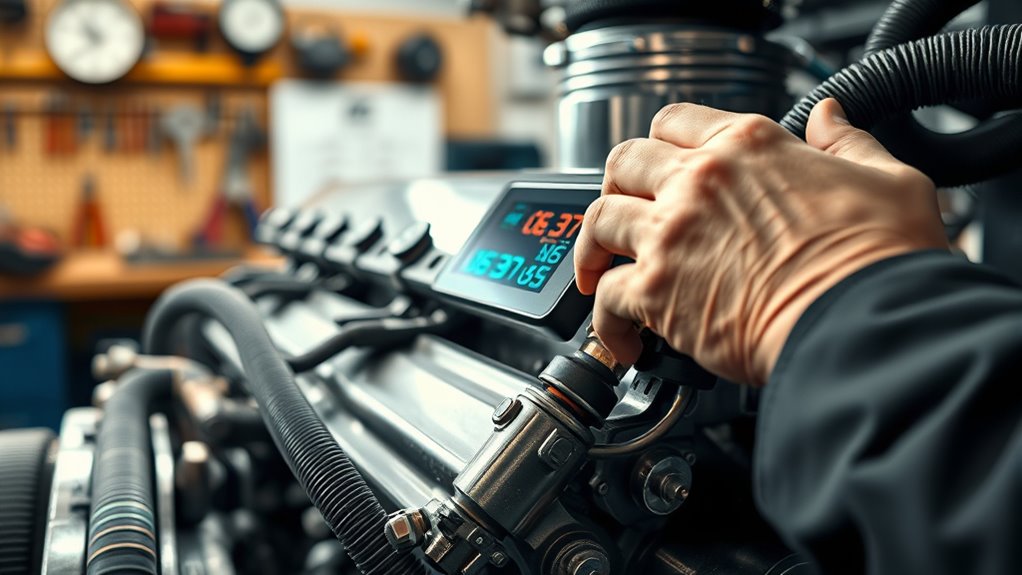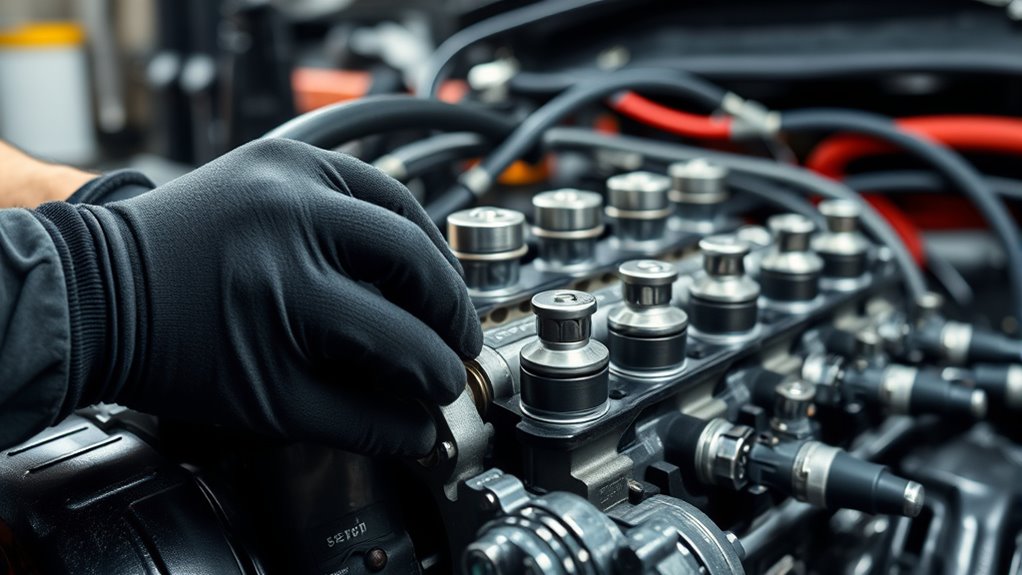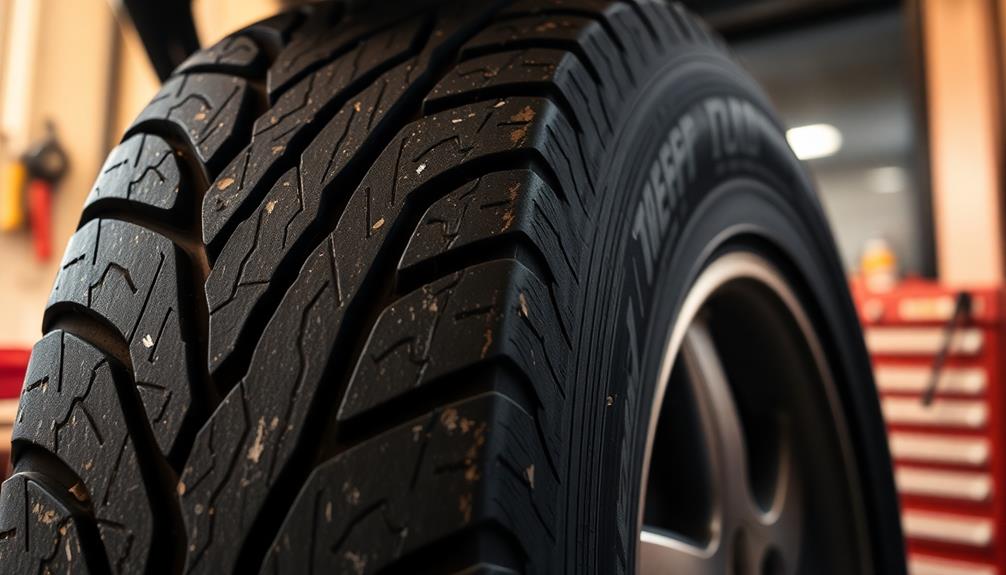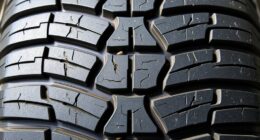To maintain a diesel engine, use high-quality fuel and reputable additives to improve efficiency and prevent deposits. Regularly check and replace your fuel filters, and monitor engine diagnostics to catch problems early. Keep your fuel system clean and avoid contaminants like dirt and water. Address any signs of trouble, such as loss of power or smoke, promptly to avoid costly repairs. Keep up with simple maintenance tasks, and you’ll guarantee your diesel runs smoothly longer.
Key Takeaways
- Use high-quality fuel and add vetted fuel additives to keep the fuel system clean and efficient.
- Regularly replace or clean fuel filters to prevent contaminants and water entry.
- Perform routine engine diagnostics to detect and address issues early.
- Monitor engine oil, coolant, and fluid levels, and address any irregularities promptly.
- Follow manufacturer guidelines for maintenance schedules and use reputable products for optimal performance.

Maintaining a diesel engine properly guarantees it runs smoothly and lasts longer. One of the key steps in this process involves understanding how fuel additives and engine diagnostics can keep your engine in top shape. Fuel additives play a crucial role in ensuring your diesel operates efficiently. They help clean the fuel system, reduce soot and deposits, and improve combustion. Using the right additives can prevent issues like clogged filters, poor fuel economy, and knocking. When choosing fuel additives, opt for reputable brands and follow the manufacturer’s instructions to avoid overuse, which can sometimes cause more harm than good. Additionally, selecting vetted products ensures you use safe and effective formulations that protect your engine.
Proper diesel maintenance with fuel additives and diagnostics ensures engine longevity and optimal performance.
Regularly checking your engine diagnostics is equally important. Modern diesel engines are equipped with onboard diagnostic systems that monitor various components and alert you to potential issues early on. By performing routine diagnostics, you can catch problems such as sensor failures, fuel injection issues, or exhaust system malfunctions before they escalate into costly repairs. Many mechanics now use advanced diagnostic tools to connect to your vehicle’s computer system, providing detailed reports on engine performance and highlighting areas needing attention. Staying proactive with diagnostics allows you to maintain peak engine efficiency and prevent breakdowns.
Furthermore, proper maintenance involves keeping your fuel system clean. Over time, contaminants like dirt and water can enter your fuel tank, causing corrosion and clogging fuel filters. Regularly replacing or cleaning filters ensures clean fuel reaches the engine, enhancing performance and longevity. When refueling, consider using high-quality diesel and avoid low-grade fuels that might contain impurities. Some fuel additives are designed to enhance the lubricity of diesel, which is especially important in colder climates to prevent fuel gelling and ensure smooth starting.
Another critical aspect is monitoring your engine’s performance through diagnostics. If you notice signs such as decreased power, excessive smoke, or rough idling, don’t ignore them. These symptoms often indicate underlying issues that can be diagnosed with specialized equipment. Addressing problems early saves money and prevents further damage. Additionally, routine checks of fluid levels, including oil and coolant, help maintain engine health and prevent overheating or excessive wear.
Finally, consistent maintenance routines combined with the strategic use of fuel additives and regular engine diagnostics will keep your diesel engine running reliably for years. Staying vigilant and proactive ensures your vehicle operates at peak performance, reducing downtime and repair costs. By understanding the importance of these maintenance tools, you take control of your engine’s health, making sure it delivers power when you need it most.
Frequently Asked Questions
Can I Use Regular Gasoline in a Diesel Engine?
No, you can’t use regular gasoline in a diesel engine. Doing so can severely damage your engine, reduce fuel efficiency, and increase engine noise. Diesel engines are designed for heavier fuel, and gasoline won’t combust properly, leading to costly repairs. Always use the correct diesel fuel to keep your engine running smoothly, maintain ideal fuel efficiency, and minimize noise. Stick to diesel fuel to avoid engine issues and ensure longevity.
How Often Should I Change a Diesel Fuel Filter?
You should change your diesel fuel filter every 10,000 to 15,000 miles, but check your vehicle’s manual for specific replacement intervals. The fuel filter lifespan can vary based on driving conditions, so pay attention to any signs of fuel flow issues or engine performance drops. Regular replacements help prevent contaminants from reaching your engine, ensuring peak performance and longevity. Don’t neglect this maintenance step for smooth diesel engine operation.
What Are Signs of Diesel Engine Coolant Leaks?
Think of coolant leak detection like spotting a slow leak in a tire; if you ignore it, your engine overheats. Signs of diesel engine coolant leaks include puddles beneath your vehicle, a sweet smell, or rising temperature gauges. You might notice engine overheating signs, such as steam or warning lights. Catching these early prevents major damage, so stay alert for any coolant loss or unusual engine behavior.
Is It Necessary to Use Diesel Additive Treatments Regularly?
Yes, you should use diesel additive treatments regularly to guarantee peak performance. These additives help with fuel stabilization, preventing degradation over time, and improve engine lubrication, reducing wear and tear. By consistently adding them, you keep your diesel engine running smoothly, especially if you store fuel for long periods. Regular use of additives also helps maintain fuel efficiency and prevents issues caused by contaminants or moisture buildup.
How Does Cold Weather Affect Diesel Engine Maintenance?
A stitch in time saves nine, especially in winter. Cold weather impacts diesel engines by causing fuel gelling, which can clog filters and lines. To keep your engine running smoothly, follow winterization tips like using anti-gel additives, storing fuel properly, and keeping your tank full to prevent moisture buildup. Regular maintenance and awareness of cold effects help your diesel engine perform reliably through the chill.
Conclusion
By regularly checking your diesel’s fuel system and changing filters, you’re actually helping it run smoother and last longer. Some say diesel engines last forever if properly maintained—there’s truth to that. Keeping an eye on oil levels and ensuring proper fuel quality can prevent costly repairs down the line. When you stay proactive, you’re not just maintaining your vehicle; you’re revealing its true potential. So, stick to these tips, and your diesel will thank you with reliable performance.









